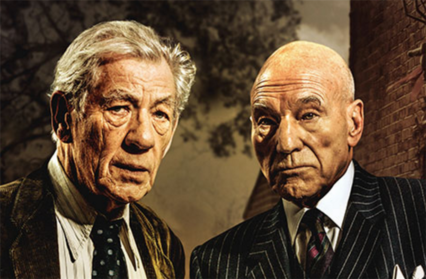Most plays are comprised of words; few plays hold their words as the very essence of their allure, transcending their art form to become more than their substance and metamorphosing into poetry which exists in and of itself, self-sustaining regardless of meaning. No Man’s Land is one such play. A stunning illustration of the heights the English language can reach, there is little that can prepare a Pinter virgin for the sheer onslaught of linguistic mastery that forms the core of this play. Harold Pinter plays with language, revelling in satirical semantics and wooing the audience with the intricacies of his character’s verbal sparring.
Patrick Stewart and Ian McKellen rise to the challenge, capturing both the verbal and visual nuances of their contrary characters; Stewart as the wealthy, successful litterateur, Hirst, confined to his solitude, preoccupied with memories of his past, and McKellen as the struggling poet, Spooner, a shadow of his compatriot, eager to offer his services in dragging him from nostalgia for motives decidedly selfish. Each forms the mirror image to what they might have been had their paths followed the other’s trajectory.
Nostalgia and the tendency to dwell on memories from their youths are principal characteristics uniting the two writers; Spooner reminisces on his past whilst Hirst makes frequent reference to his photo album full of nameless faces. All aspects of Stephen Brimson Lewis’ set accentuate Hirst’s solitary lifestyle; a single comfortable chair dominates a cool, blue room devoid of any personal effects, save a bar full of spirits which marks the other key similarity between the poets – their predilection for alcohol, signifying their search for comfort in the oblivion of inebriation. The entirety of the play is devoted to talking and drinking, contributing to the unreliability of the narrators, as their tales become increasingly fantastical in their efforts to best each other.
Stewart and McKellen have the audience in the palms of their hands from the outset – their immense stage presence demanding unwavering attentiveness. Whilst the writing itself is undoubtedly comical, it is the actors’ impeccable delivery of the lines which realises its true comedic value. Likewise, Sean Mathias has directed the play with consummate skill, instilling humour in even the most prosaic of actions, but it is the pair’s ability to turn humour into hilarity with the slightest of movements and changes in facial expression, which truly breathes life into the performance.
The absurdist nature of the play emerges in the characters’ “quaint little perversions” and unpredictability, both in actions and in words. Long periods of stasis are juxtaposed with sudden motion as they careen from maudlin to flamboyant throughout their superficially unconnected anecdotes. Owen Teale’s Briggs is a contradictory character, simultaneously the harshest and softest of the four men and often adding a layer of menace to otherwise innocuous statements. Conversely, Damien Molony’s Foster has a lightness of tone, even when discussing the metaphorical No Man’s Land “which never moves, which never changes, which never grows older, but remains forever, icy and silent.”
All four characters are named after cricketers – a great love of Pinter’s and with multiple layers of meaning. At a base level, the allusion to such a quintessentially English sport emphasises the Britishness of the play, and the fact the characters’ namesakes are all players from the game’s ‘Golden Age’, most of whom were often pitted against each other, is reflected in the spiky dynamics of the four characters, each either striving for their future or longing for their past golden ages. “I was one of the golden of my generation. Something happened. I don’t know what it was.”
New Theatre, Cardiff












